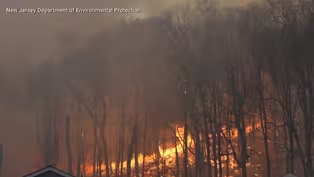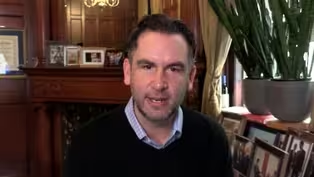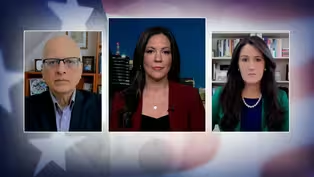NJ Spotlight News
Voters are anxious about the 2024 election
Clip: 11/4/2024 | 5m 8sVideo has Closed Captions
Interview: Bobby Brier, NJ Spotlight News’ mental health writer
A report from the American Psychological Association finds stress related to the 2024 election is only slightly higher than it was four years ago, but significantly greater than it was in 2016. NJ Spotlight News' mental health writer Bobby Brier looked into the issue and how some are trying to cope.
Problems playing video? | Closed Captioning Feedback
Problems playing video? | Closed Captioning Feedback
NJ Spotlight News is a local public television program presented by THIRTEEN PBS
NJ Spotlight News
Voters are anxious about the 2024 election
Clip: 11/4/2024 | 5m 8sVideo has Closed Captions
A report from the American Psychological Association finds stress related to the 2024 election is only slightly higher than it was four years ago, but significantly greater than it was in 2016. NJ Spotlight News' mental health writer Bobby Brier looked into the issue and how some are trying to cope.
Problems playing video? | Closed Captioning Feedback
How to Watch NJ Spotlight News
NJ Spotlight News is available to stream on pbs.org and the free PBS App, available on iPhone, Apple TV, Android TV, Android smartphones, Amazon Fire TV, Amazon Fire Tablet, Roku, Samsung Smart TV, and Vizio.
Providing Support for PBS.org
Learn Moreabout PBS online sponsorshipWell, no matter who you're voting for this election, the stress and anxiety is real.
The major party candidates have framed the presidential race as an existential battle and it appears most people have taken those warnings to heart.
A report from the American Psychological Association finds stress related to the 2024 election is only slightly higher than it was four years ago, but significantly greater than it was in 2016.
In New Jersey, a majority of voters also expressed some kind of dread when asked about this election cycle.
That's according to another survey.
With so many people going into Tuesday on edge, our mental health writer Bobby Brier looked into the issue and how some are trying to cope.
Bobby, it's good to be with you.
This has been a hot topic lately.
So why is the uncertainty more widespread right now?
What's driving it.
Really?
There's a few drivers of it right now, Brianna.
One of them being that many people anticipate this election to be very close and maybe not called after tomorrow night.
In addition to that, we're really seeing a lot of negative images and content on social media that mental health professionals have pointed to as really polarizing people further in their beliefs and maybe kind of creating some of these echo chambers that they have pointed to where a lot of these maybe negative beliefs they have are kind of reinforced with the content that they're viewing.
And finally, a lot of it is related to the fact that we're in a geographic location between two major media markets, Philadelphia and New York, where they're really trying to influence the outcome of the election in a battleground state like Pennsylvania.
And because of that, there's so many more negative ads that New Jersey voters are seeing that is really contributing to an increase in negative mental health for for many voters, according to experts.
Yeah.
And now on so many platforms, not to mention phone calls, text messages, everything.
But I mean, you talk to voters, what is it exactly that they're stressed about?
Is it potentially violence or protest after the election?
Or is it simply who is going to be sitting in the Oval Office?
It's really a combination of both.
A lot had pointed to the fact that they're worried about, as they had said, the future of their country, pointing to specific issues in particular like immigration, the economy and women's rights.
Others have said that the anxiety that they feel will most likely dissipate after tomorrow night's election.
And many had said that they just want it to be over with because a lot of their favorite TV shows or sporting events have multiple different issues right now where they're seeing a lot of negative ads and they just kind of want that to be drawn to a close.
So it's definitely something that many are saying worry about the future of the country.
Others are just saying that they'd like to see it wrapped up sooner rather than later.
Well, that's interesting, right, because it feels like the election cycle starts earlier and earlier every year where those negative ads start.
I mean, not to mention we have a candidate, you know, former president Donald Trump, who's been in the ether of the electoral ether for a decade now.
So folks have been consuming that media for ten years.
Absolutely.
And I think in addition to that, that feeling, a lot of the mental health professionals that I've spoken to have said that in order to kind of cope with that, there's a couple of things that folks can do.
In addition to take care taking care of their physical health, just also making sure that they monitor their social media activity, making sure they take time to take a break from it, as well as setting boundaries, maybe with loved ones, if they have differing political opinions, to make sure that they get out and move and exercise as well, and to kind of essentially unplug from a lot of the news or content that they're viewing right now.
I wonder, too.
I mean, stress and anxiety affect people differently.
Is it also something where people are coming together over it, where they feel like, hey, I'm not alone?
A lot of other people feel the same way.
They are.
And I think that is one of the positive aspects of this, or maybe one of the silver linings that mental health professionals have pointed to if they're going out to door knock early on or if they're going in-person early voting, maybe with a group of friends or a loved one or a family member, that is definitely a positive aspect of addressing one's stress or anxiety over the election to really put that worry into action for whoever you're voting for, to make sure that you're getting out there and being proactive rather than reactive to the stress and anxiety that you may be feeling.
I mean, we mentioned the last couple of election cycles, but is it typically or historically normal for folks to feel some type of stress leading up to a major election?
There is, yeah.
And I think in this one in particular, it's a little bit heightened right now because of the state of the nation where people are seeing it and just the polarization that many people are feeling and the polarization between candidates and political parties, that's really heightened by the presence of social media and well, as well as what we've seen is a lack of newspapers nationwide.
You're not getting unbiased, objective reporting.
Many people are going to these silos that kind of reinforce some of the negative thoughts or images that they've seen in the past.
Yes.
Curating their news feeds, as they like to say.
Bobby Brier, great piece.
You can, of course, read Bobby Brier's full article on our website, NJSpotlightNews.org.
Thanks, Bobby.
Thanks, Bri.
Dangerous wildfires brought under control, risk remains high
Video has Closed Captions
Clip: 11/4/2024 | 1m 22s | September and October have been NJ's driest consecutive months (1m 22s)
Fulop: Reps. Gottheimer, Sherrill dishonest with voters
Video has Closed Captions
Clip: 11/4/2024 | 4m 18s | Gottheimer calls it "hypocrisy from Flip-Fulop" (4m 18s)
Harris, Trump supporters 'live in their own worlds'
Video has Closed Captions
Clip: 11/4/2024 | 6m 4s | Interview: Pollsters Ashley Koning and Patrick Murray (6m 4s)
NJ food banks prep for Thanksgiving demand
Video has Closed Captions
Clip: 11/4/2024 | 3m 46s | Community Food Bank of New Jersey now providing turkeys, nonperishable items (3m 46s)
Providing Support for PBS.org
Learn Moreabout PBS online sponsorshipSupport for PBS provided by:
NJ Spotlight News is a local public television program presented by THIRTEEN PBS















